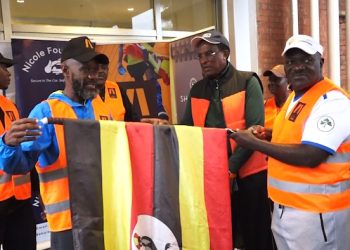The inaugural State of Ugandan Sport Symposium, hosted by NBS Sport at Next Media Park, opened Tuesday with a powerful call for reform, unity, and urgency in shaping the future of Ugandan sport.
From policy to infrastructure and talent development, day one of the two-day event served up candid conversations and bold declarations that laid bare the sector’s biggest challenges and opportunities.
With the overarching theme “Bridging the Gap,” the symposium brought together athletes, coaches, policymakers, private investors, and administrators for a rare and much-needed dialogue on how to elevate sport in Uganda from potential to prosperity.
The opening morning session, broadcast live on NBS Sport, kicked off with a panel on “Sports Policy and Governance” featuring Sports Lawyer Timothy Kaija, Dance Sport Federation Secretary General Barnabas Sebuyungo, and KCCA Volleyball Club Head Coach Shilla Omuriwe Buyungo.
The panel dissected the implications of the recently enacted National Sports (Amendment) Act, 2024, questioning its effectiveness in enforcing professionalism, equity in funding, and institutional accountability.
Kaija called for a culture shift across Uganda’s sports institutions, emphasizing the need for more dialogue and collaboration.
Sebuyungo reinforced the urgency to view sport as a viable investment and said that the two-day symposium would set the pace.
But it was coach Omuriwe’s raw admission that struck a deeper nerve. “I didn’t even know there was a Sports Act I was working under,” she said, highlighting a wider disconnect between policymakers and on-the-ground stakeholders.
Her remarks underscored the need to make laws more accessible to coaches, athletes, and federation members alike.
The session also raised calls for transparency, improved leadership, and broader institutional capacity to implement meaningful reforms across federations.
At midday, the conversation shifted to “Talent Identification and Grassroots Programs”, with Jermaine Egesa moderating a discussion between sports administrator Jibe Kalule and former national rugby captain Hellen Buteme.
The panel pushed for more government involvement in grassroots initiatives, warning that without sustainable talent pathways, Uganda’s sporting future would remain stunted.
In the afternoon, attention turned to “Uganda’s Readiness to Host CHAN 2024 and AFCON 2027”, moderated by veteran sports journalist Mark Ssali.
The panelists were led by NCS General Secretary Dr. Bernard Patrick Ogwel, alongside investor Jonard Asiimwe and Aggrey Ashaba, Chairperson of the Uganda Chamber of Mines and Petroleum.
Ogwel confidently declared Uganda ready to host both CHAN and AFCON, citing ongoing renovations and infrastructure upgrades.
“Uganda started preparations even before CHAN was awarded. There should be no doubt about our readiness,” he said, adding that four new training facilities worth UGX 13 billion each will be constructed in Hoima.
Responding to long-standing concerns from Uganda’s athletics icons like Cheptegei and Kiplimo over poor government support, Ogwel stated that measures are being taken.
“The government is committed to supporting athletes both during their careers and in retirement,” he said.
He emphasized the importance of cooperation across sectors: “The state of Ugandan sport is bright, but it needs all stakeholders to work together.”
Investor Jonard Asiimwe gave a sobering yet optimistic view of sports investment: “Last season, I spent over UGX 1.2 billion sponsoring clubs. We didn’t see profits, but we continue for the good of the game. The profits will come.”
The final takeaway from day one? Uganda’s sports ecosystem is rich in talent and ambition.
But unless laws are made accessible, investment is measured, and stakeholders speak the same language, the promise of progress will remain out of reach.
Day two of the symposium continues today, Wednesday, with two major topics on the agenda: The Sponsorship Landscape in Ugandan Sport and Building a Sustainable Sport Ecosystem.





























